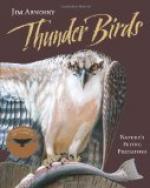He held out a roll of bills tied with a string; a roll big as Johnny’s wrist. Johnny looked at it, looked into Eland’s lean, grimy face queerly. “Good golly!” he said in a hushed tone, and that was the first normal, Johnny-Jewel phrase he had spoken for six days.
“Well, there’s plenty to see yuh through, if you want to try the Coast,” Bland urged, watching Johnny’s face avidly. “Way they done yuh dirt here, bo, I couldn’t git out quick enough, if it was me. I’ll say I couldn’t. And out there’s where the real money is. Here, I’ve taken everybody up that’s got the nerve and the ten dollars. In Los Angeles you can be taking in money like that every day. F’r cat’s sake, bo, let’s git outa this. They ain’t handed you nothin’ but the worst of it.”
He had changed his point of view considerably since he painted the picture of easy wealth in Tucson, to be won on the strength of the newspaper publicity Johnny had acquired. He had seen something in Johnny’s face that encouraged him to suggest Los Angeles once more as the ultimate goal of all true aviators. Johnny had nothing to hold him, now that Mary V had broken with him—as Bland understood the separation. With Mary V’s influence strong upon Johnny’s decisions, Bland had bided his time; but there was nothing now to hold him, everything to urge him away from the place. And Bland pined for the gay cafes on Spring Street. (They are not so gay nowadays, but that is beside the point, for Bland remembered them as being gay, and for their gayety he pined.)
Johnny resorted to his old subterfuge of rolling and smoking a cigarette very deliberately while he made up his mind what to do. And Bland watched his face as a hungry dog watches for flung scraps of food.
“Aw, come on, bo! F’r cat’s sake let’s get to a regular town where we got a chance to make real money! Why—think of it! We can start now, and with luck we can sleep in Los Angeles to-night. And it won’t be hot like it is here, and you can git a decent meal and see a decent show while you put yourself outside it. And,” he added artfully, giving the propeller a pull, “the Thunder Bird is achin’ to fly. Look underneath, bo. I’ve got her name painted on the under side, too, so she’ll holler her name like a honkin’ goose as she flies. And you don’t want her to go squawking Thunder Bird to these damn’ hicks, I guess, and keep ’em rememberin’ that you spent six days—”
“That’ll be about all,” Johnny cut him short. “No, I don’t want anything more of this darn country. I’m willing to fly to Los Angeles or Miles City, Montana—just so we get outa here. Come on, if you’re ready. We’ll make a bee line for the Coast. We’d better take grub and water in case of accidents. You know what happened to the poor devils that lost this plane in the first place, before I got it.”
Bland’s jaw went slack. Los Angeles, that had seemed so near, wavered and receded like a fading mirage. What had happened to those who had abandoned the plane where Johnny had found it was a horror Bland disliked to contemplate; a horror of thirst and crazed wanderings over hot Band and through parched greasewood, with lizards and snakes for company.




